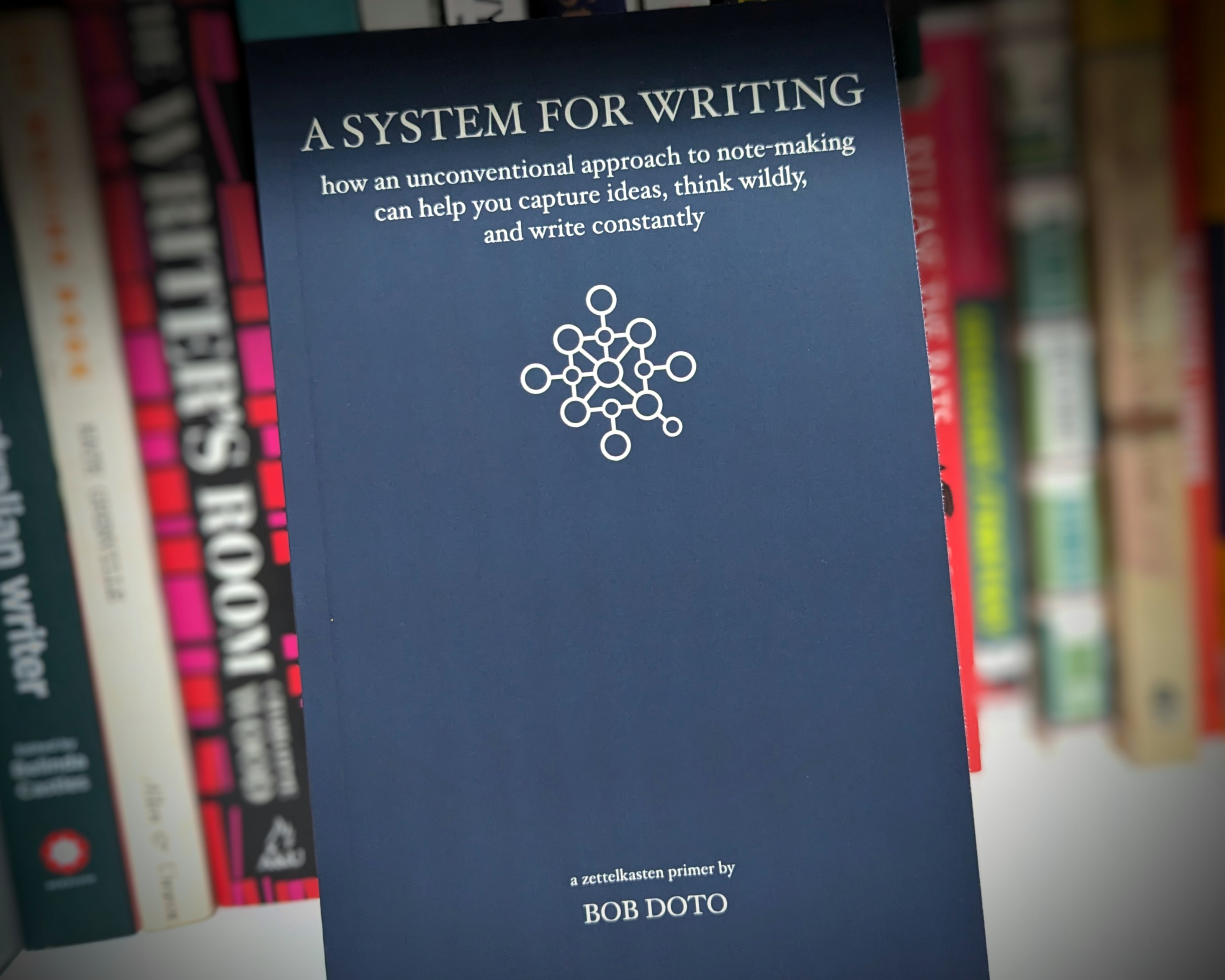What I Learned from Bob Doto about Making Effective Notes and Writing a Book
Historian Dan Allosso hosted a reading group a while back (time flies) to discuss Bob Doto’s excellent Zettelkasten primer, A System for Writing.
See the video.
All of these live online events seem to take place in the middle of the night here in Sydney. Since I value my sleep, I don’t attend at 3am. But I’m still paying attention, and happily Dan posted the discussion online. About half-way through (58 minutes), the author himself appeared and I found the discussion very helpful. So here are my notes on what I managed to pick up from the conversation (even though I was cheerfully distracted by Eric’s cat).
 *We're asleep when you're awake, look!*
*We're asleep when you're awake, look!*
In a nutshell: the discussion included Bob Doto’s advice on effective note-taking and book writing. He emphasised a flexible and iterative approach. Atomic notes form the foundation, and they fuel a self-informing process where notes spark further investigation. The writing process itself is iterative; it involves “bricolage,"1 to transform notes through heavy editing and reorganisation into a coherent whole. Key to successful book writing is clear audience definition and a commitment to extensive revision, along with a focus on accessible structure rather than solely on indexing. Finally, the system’s effectiveness relies on integrating the various stages (reading, note-taking, and writing) into a continuous, cyclical process, where the value of experimentation and adaptation, including judicious use of AI tools, is recognised.
Note-making Approach
- Use declarative statements as note titles to clearly indicate the content
- Think of atomic notes as quotes (whether from others or yourself)
- Allow the system to be somewhat flexible rather than overly rigid
- Let the note-taking process be self-informing - one note can heighten interest in a topic and lead to more connections
Writing Process
- Don’t just cut and paste notes - transform them through heavy editing
- Start by getting ideas on the page rather than trying to write perfectly from the beginning
- Build writing through “bricolage” - assembling pieces and then crafting them into a coherent whole
- Fill gaps between ideas with connecting material as needed
- Be prepared to spend significant time editing and reorganizing
- Don’t be afraid to repurpose your own writing from other contexts (e.g., comments, essays)
Book Writing Insights
- Clear audience definition is crucial but challenging
- Expect to spend months doing intensive editing (Doto mentioned “10-hour days”, to which I say: Doto don’t be a hero)
- Be prepared to print chapters repeatedly and heavily revise them
- Focus on making the content accessible through good structure rather than relying on an index
- Consider making a detailed table of contents to help readers navigate. Be willing to “muscle through” difficult sections - there’s no shortcut
System Integration
- Allow the Zettelkasten system to become more fluid over time (i.e. become less rigid in following the ‘rules’)
- Different parts of the process (reading, note-taking, writing) should inform each other
- Don’t get too caught up in (note) definitions; focus on functionality and value
- Embrace the cyclical nature of the process - notes inspire interest which leads to more notes
Practical Tips
- Start in the middle and build outward when writing
- Use your notes as building blocks but be prepared to heavily modify them
- Trust your instincts about when something needs more explanation or connection
- Be willing to revise extensively to maintain consistent tone and flow
- Consider using AI tools (like ChatGPT) selectively when stuck, but always rework the output
What I learned from this discussion
Bob’s emphasis on flexibility might offer genuine relief to some people. A lot of the online chat about personal knowledge management and so on seems to radiate a certain anxiousness about getting it right and avoiding mistakes. The system described here though isn’t about perfection. It adapts to your pre-existing schedule, your quirky (or dependable) thinking patterns, and your particular brand of chaos, whatever that may be. Notes can sit dormant for months before suddenly becoming relevant. Writing happens in fragments, and that’s fine because they’ll be assembled later into something coherent.
It’s been said the best systems bend without breaking, and my writing system is pretty bendy and not very breaky. The real insight I gained from reviewing this discussion was about trusting the process enough to let it be imperfect. The key is to trust that consistent engagement with ideas, however scattered, eventually yields something worthwhile. Well that has in fact been my own experience so it’s nice to see it confirmed.
It was also a reminder to stay asleep at three in the morning.
For more details of this system for writing, you might want to check out Bob Doto’s book of that name, A System for Writing, which I’ve previously reviewed.

-
I have more to say about this. Much more. ↩︎